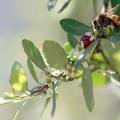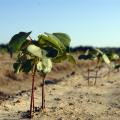News From 2014
MISSISSIPPI STATE -- Fields that appear lush and green from the highway may be deceiving: Plant roots could be struggling to grow and find resources because of underground soil compaction.
Compacted soil has usually been compressed when equipment travels over it, forming a dense layer somewhere below the surface. The depth of this layer and its thickness depend on a variety of factors, including soil texture, moisture, organic matter and past use.
STONEVILLE -- Mississippi rice producers may need to intensify their treatment of the most important late-season pest in rice based on new recommendations from researchers at the Delta Research and Extension Center.
Jeff Gore is a Mississippi State University Extension Service entomologist at the Stoneville station who conducts research with the Mississippi Agricultural and Forestry Experiment Station. He said past recommendations for rice stink bug treatment were based on a time frame rather than a growth stage.
MISSISSIPPI STATE -- Mississippi State University faculty member Rita W. Green will serve another year on a key policymaking board for the U.S. Department of Agriculture.
MISSISSIPPI STATE – Twice a year, I get the urge to do something “wild” in my backyard. Now, granted, this is something I could do year-round in my neck of the woods, but the sounds of the birds and the bees twittering and buzzing away -- usually in the spring and fall -- really get me excited.
My foray into the wild side begins with identifying what my backyard already has to offer in the way of food, water, shelter and a place to raise young. My venture: to fill in the gaps.
LOUISVILLE -- Disaster assessment teams with the Mississippi State University Extension Service are providing “boots on the ground” as agricultural landowners begin the process of recovering from the April 28 storms.
“These trained teams can assess immediate and long-term needs,” said Elmo Collum, a disaster response coordinator with the MSU Extension Service. “They may discover issues that need to be addressed immediately, such as an injured animal, or they may see things that will take weeks of effort, such as fence repair.”
JACKSON – For Extension agents, education is more than the exchange of information. It’s personal. It is a connection to their students and a sense of responsibility for the outcomes.
It’s been that way since 1914, when the Cooperative Extension Service was established by the Smith-Lever Act. In the past 100 years, the organization, now known in the state as the Mississippi State University Extension Service, has delivered research-based information to Mississippians that helped them raise crops, livestock and families.
BEAUMONT – Gardeners can learn techniques and tips for producing vegetables and fruits during the annual field day at the Mississippi State University Beaumont Horticulture Unit on July 12.
The Vegetable Field Day is open to professional growers and others interested in growing their own food.
Experts with the MSU Extension Service, Mississippi Agricultural and Forestry Experiment Station and Auburn University will discuss a variety of topics, from pest management for small producers to the best grape varieties for the South.
Mississippi State, Miss. -- A Mississippi State University College of Veterinary Medicine student has won an award for her communication skills.
Hillary May of West Virginia has been selected as the 2014 Bayer Excellence in Communication Award winner for MSU.
MISSISSIPPI STATE -- Mississippi State University researchers were part of the team that learned that giant and red pandas have different digestive microbes, a finding with important implications for conservation efforts and captive animal rearing.
Gastrointestinal diseases are the major cause of mortality in wild and captive pandas, but little is known about their digestive process.
A dizzying array of new plants for the home landscape and garden are promoted every year, and several got their starts along our roadsides and ditches.
Horticulturists often say that many of our landscape plants are only a step or two out of the ditch. One of my favorite ditch-loving varieties that bloom each spring is Queen Anne’s Lace. Some people consider them weeds, but I believe they have many worthy qualities.
MISSISSIPPI STATE – Frequent rains kept farmers indoors through much of April, but clear weather in early May allowed them to play catch-up on row-crop planting.
The U.S. Department of Agriculture reported that planting of most of the state’s row crops is back on schedule after the wet early spring. Corn is the first crop planted in Mississippi and much of it was planted on schedule. As of May 11, USDA reported cotton is 45 percent planted, rice is 68 percent planted, grain sorghum is 42 percent planted and soybean is 55 percent planted.
MISSISSIPPI STATE -- Gardening season is in full swing, and rain barrels are displayed for sale in local gardening stores. Rain barrels are systems that collect rainwater that would otherwise be lost into city sewers. The rainwater can be used to keep tomatoes, herbs and other treasured garden plants flourishing.
The Environmental Protection Agency estimates that 40 percent of total household water use during the summer is for lawn and garden watering. Rain barrels are easy ways to both conserve water and cut your water bill.
MISSISSIPPI STATE -- Belt buckles and saddles are coveted in the barrel-racing world, and Mississippi is home to a prestigious trophy for the first time this year.
The Better Barrel Racing Association has named Bricklee Miller, manager of the Mississippi Horse Park at Mississippi State University, as the National Producer of the Year for 2013. The award recognizes Miller’s efforts to produce the Horse Poor Barrel Racing event in conjunction with the Better Barrel Racing Association Eastern Regional Tour Finale last October.
MISSISSIPPI STATE -- Mississippi State University wildlife and fisheries major Charles Parker hooked the $10,000 first place prize during MSU's Office of Entrepreneurship and Technology Transfer Entrepreneurship Week for his fishing gear business.
Parker acquired Rod Sox, a fishing rod protector company, in May 2013 after deciding he wanted to follow in his father’s footsteps and work in the fishing tackle industry.
MISSISSIPPI STATE -- Virginia Mathews enjoys horses so much that she gladly took on a full-time job to allow her to keep them.
Mathews, known as Gigi to her friends and family, is a Yazoo County woman who owns Mathews Farms in Benton with her husband, Hugh Leigh Mathews III. She now cares for 11 horses and teaches riding lessons, but at one time she had as many as 76 mares.
“One time I added up all the time I spent working with the horses and figured I was making 2 cents an hour,” Mathews said. “I went to work full time with the U.S. Postal Service to support my habit.”
MISSISSIPPI STATE -- An academic advisor with the Mississippi State University College of Veterinary Medicine has received two awards for excellence in student advising.
Julie “Missy” Hadaway, admissions and student affairs coordinator, has been awarded the 2014 Irvin Atly Jefcoat Excellence in Advising award at MSU. She was also selected for an Outstanding Advising Certificate of Merit in the primary advising role category by the National Academic Advising Association.
PICAYUNE -- When Navy Petty Officer First Class Andrew Ribar realized the Mississippi State University Crosby Arboretum could use a little help, he mustered all hands on deck.
Ribar, a military community outreach coordinator for the U.S. Navy’s Fleet Survey Team located at NASA’s John C. Stennis Space Center near Bay St. Louis, brought about 20 Navy chiefs and first class petty officers to work on the arboretum in Picayune on May 8.
Did you know bells work well in the landscape?
For years, one of my favorite landscape plants has been Heuchera, commonly called coral bells. I don’t think you can beat the landscape punch of texture and color these plants bring. Coral bells bloom, but I grow them strictly for the foliage.
I’m gaining appreciation for another “bell” in my garden called Heucherella, or foamy bells. These plants are hybrids, the result of crossing Heuchera and the closely related Tiarella (foam flower).
MISSISSIPPI STATE -- Two Mississippi State University administrators are helping shape natural resources education and policy in a recently released national report.
Rubin Shmulsky, head of Sustainable Bioproducts, and Bruce Leopold, executive director of the Center for Resolving Human-Wildlife Conflicts were part of a team of 35 scientists who authored “Science, Education, and Outreach Roadmap for Natural Resources.”
LOUISVILLE -- In the wake of the tornado that tore through Louisville on April 28, overwhelmed storm victims had to make tough choices about caring for people, property and pets.
But one pet owner found a way to help his dog, ironically named Twister, when a Mississippi State University Extension Service disaster assessment team visited his property. Twister had survived the tornado but had injuries that needed immediate attention.
Pages
News Types
- Crop Report (428)
- Feature Story (5908)
- Feature Photo (53)
- Extension Outdoors (320)
- Southern Gardening (1482)
- Extension Inbox (95)
Archive
- 2025 (102)
- 2024 (186)
- 2023 (182)
- 2022 (183)
- 2021 (176)
- 2020 (211)
- 2019 (222)
- 2018 (276)
- 2017 (336)
- 2016 (381)
- 2015 (456)
- 2014 (495)
- 2013 (487)
- 2012 (491)
- 2011 (354)
- 2010 (320)
- 2009 (313)
- 2008 (272)
- 2007 (263)
- 2006 (252)
- 2005 (278)
- 2004 (270)
- 2003 (279)
- 2002 (227)
- 2001 (238)
- 2000 (241)
- 1999 (231)
- 1998 (231)
- 1997 (239)
- 1996 (58)
- 1995 (36)
















